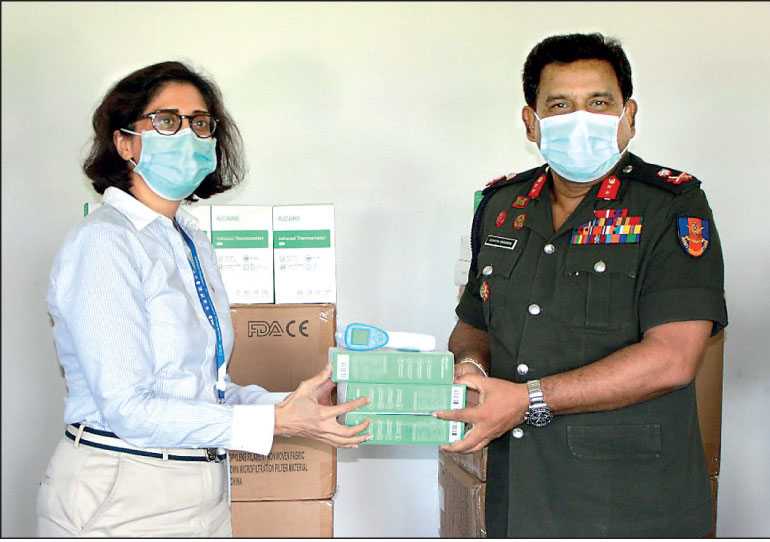Wednesday Feb 25, 2026
Wednesday Feb 25, 2026
Wednesday, 3 June 2020 00:00 - - {{hitsCtrl.values.hits}}

In the recent past, Sri Lanka has faced severe floods and landslides during the southwest monsoon. In 2017 over 879,000 people were affected causing destruction and damage to over 80,000 houses and affecting the livelihoods of over 342,000 people.
Recent weather forecasts issued by the Department of Meteorology indicates heavy rains in the coming weeks which will increase the risk of floods and landslides in the Western, Southern, Sabaragamuwa and North Western Provinces.
As some of the high-risk zones for COVID-19 fall under some of these provinces, operationalising the health and safety guidelines issued by the Ministry of Health is vital to prevent community transmission of COVID-19.
Responding to this, the United Nations Development Program (UNDP) in Sri Lanka handed over 10,000 surgical masks and 30 infrared thermometers to the Disaster Management Centre (DMC) to be distributed to relief centres, search and rescue teams and to those affected by the southwest monsoons.
Disaster Management Centre Director General Major General Sudantha Ranasinghe who was present at the handover said: “Preparing for the southwest monsoon this year also means preparing to prevent the risk of a spike in COVID-19 infections. How we respond to natural disasters have changed and we are working with UNDP to ensure relief centres are equipped to ensure the safety of those affected.”
UNDP in Sri Lanka Deputy Resident Representative Faiza Effendi added: “With the dual challenges posed by the southwest monsoon and the COVID-19 pandemic, responding to disasters require collaborative action and keeping communities informed and resilient is our priority. UNDP will continue to provide technical assistance to the national coordination and planning efforts of the DMC to ensure that no one is left behind.”
UNDP in Sri Lanka has further supported Sri Lanka Red Cross to mobilise additional resources for flood preparedness and response for flood and landslide prone Districts that are also considered high risk areas for COVID-19. UNDP in Sri Lanka has assisted in mobilising volunteers to conduct awareness programs in collaboration with the DMC, Natural Disaster Relief Services Centre, MOH office for Divisional Offices and other stakeholders including NGOs, CBOs and the private sector.
In addition, facilities for screening, disinfection and personal safety kits have been provided to relief centres. UNDP has further provided technical support to the DMC to improve virtual emergency coordination and communication at this crucial time. An analysis was also conducted to develop resource maps for emergency planning.